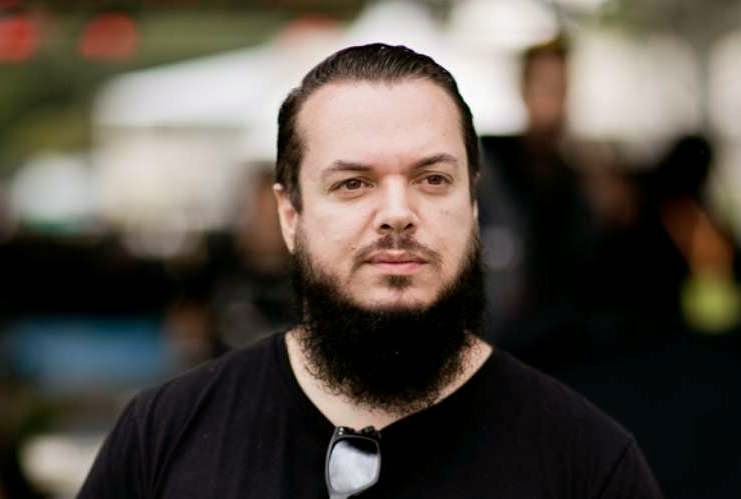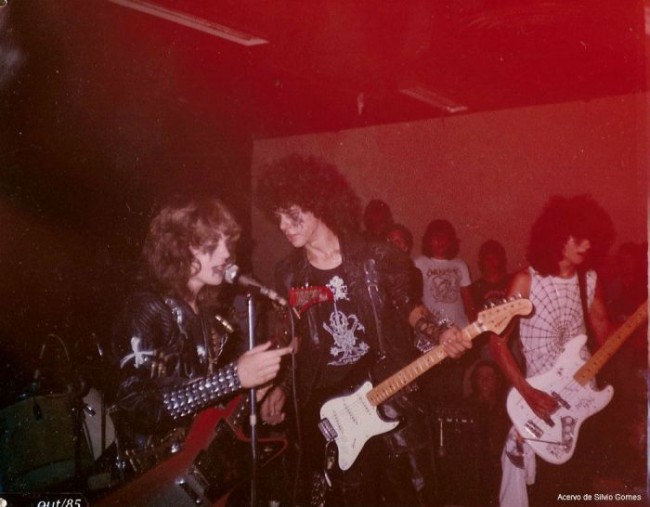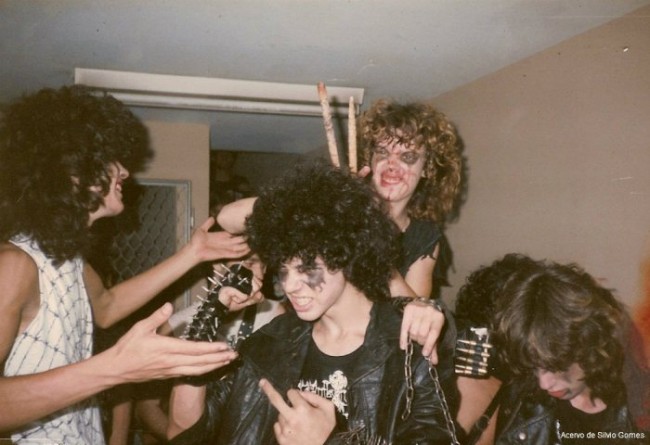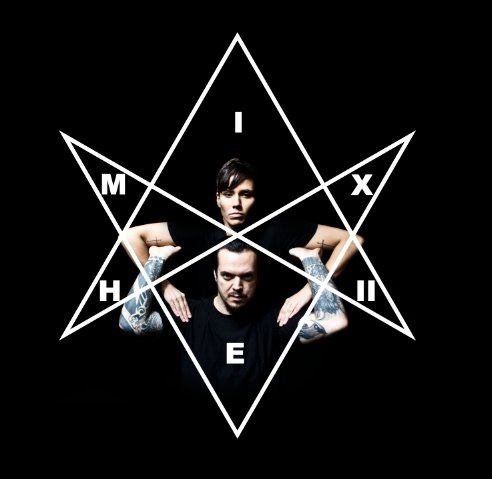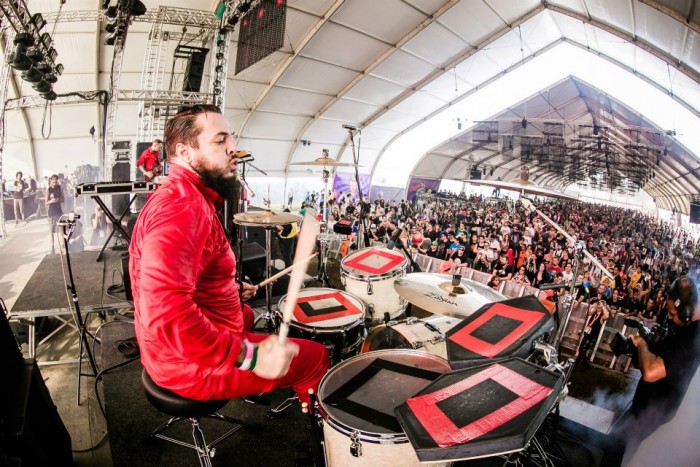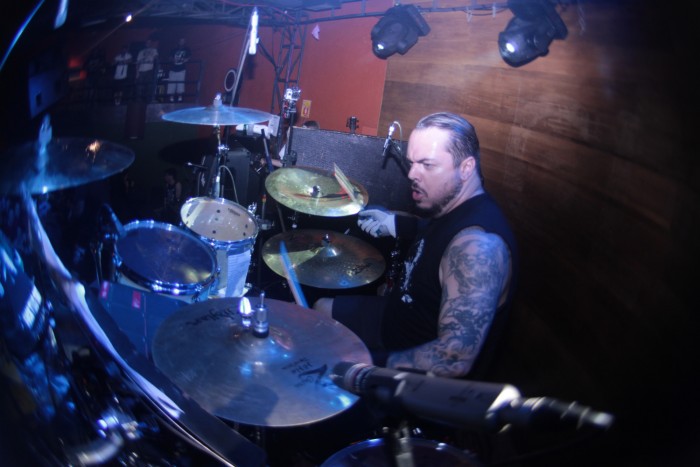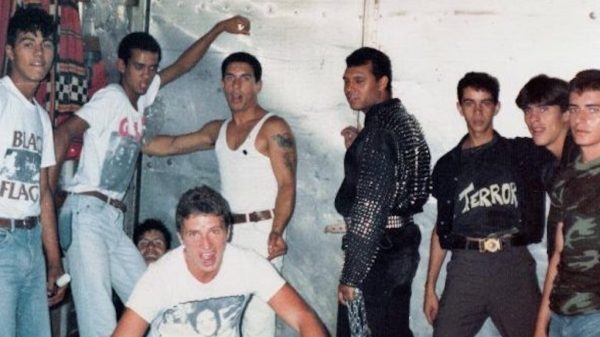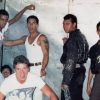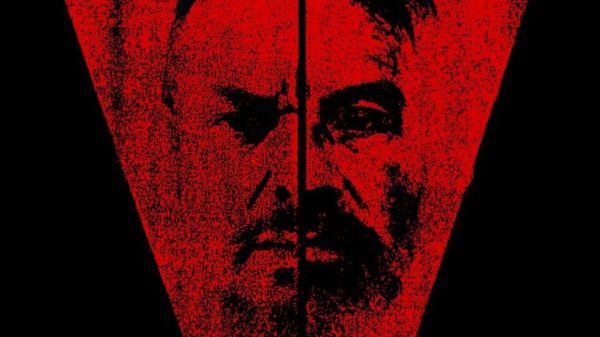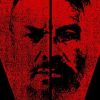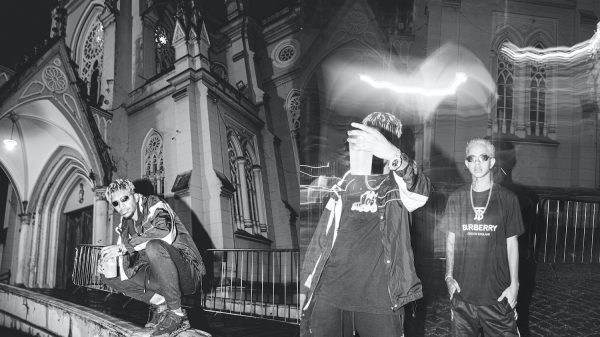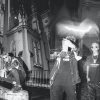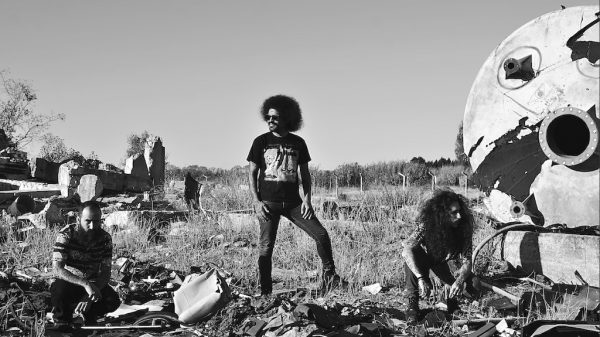Besides being one of the founders of Sepultura, with whom he played for more than 20 years and created classic records like Beneath the Remains, Arise, Chaos AD and Roots, Iggor Cavalera is also one of the most influential drummers of the last three decades.
After leaving Sepultura in 2006, he decided to focus on new projects like Mixhell with his wife Layma, and Cavalera Conspiracy with his brother Max, where they mix new songs with the old Sepultura/Nailbomb classics.
In December 2014, I had the chance to interview Iggor, and we talked about Sepultura’s first concert, his relationship with electronic music – including Ministry, Godflesh and Mixhell – Neurosis’ influence on Sepultura’s sound in the 1990s, and the records that changed his life, among other things.
(Note: The two amazing and rare Sepultura pics below were kindly shared with us by Brazilian journalist Savio Vilela – Make sure to check it out his amazing blog Desova, with great material about the Belo Horizonte scene)
Sepultura played its first concert exactly 30 years ago, in December of 1984. What are your memories of it?
Yeah, man. That’s pretty crazy. It was fucking awesome. But, at the same time, nobody really understood anything. As you can see from this is that forex trading and brokers are common when it comes to trading from best forex websites. The Sepultura lineup for this concert was me, my brother (Max) and Wagner, from Sarcófago. So it was kind of crazy, because Paulo (the bass player for Sepultura) was on vacation from school, and he was basically gone on a trip. And some other dude that played guitar with us at the time couldn’t make it to the concert because his mother wouldn’t let him go. And he was way older than us. That’s crazy, because he was 18 or even older, and his mother didn’t let him go out at night, and we were like 12 or 13 years old and stayed the whole night out. So it was kind of bizarre. But the concert was really cool, we opened for Overdose. I remember they asked us: “Do you wanna play with us?” and nobody used to let us play anywhere back then. We played after Overdose, and everybody left after we started. The only people that stayed were a punk guy and a skinhead that were kind of lost in Belo Horizonte because they were from out of town. Even our friends told us: “this concert was terrible, man.” But we really like it, so it was this kind of an odd situation. And a really cool thing about this concert is that the owners of Cogumelo Records, João and Pati, were also there. They approached us to say they really liked the concert and talked about doing the split with Overdose (released one year later, in 1985). So this show is historic since it started our partnership with the label.
 Sepultura destroying everything in 1985 (Photo by Silvio Gomes)
Sepultura destroying everything in 1985 (Photo by Silvio Gomes)
Cool. And curiously you had Overdose and Sarcófago involved on this concert, which are bands that later had some problems with Sepultura, right?
Yeah, but it was different. We were kids, so we got into trouble with everybody. It was that thing of talking shit about each other, 15 year old boys stuff, like a high school thing. So these problems were never really that serious. The other day I actually read something from some guys from Belo Horizonte (Sepultura’s hometown) that thought that Sepultura had a kind of conspiracy against the other bands. Like, how would that even be possible? Why we would stop doing our own stuff to do anything against other bands? That’s not even possible, you know? So it was kind of funny to hear this kind of stuff. Even the problems we had at the time…if it wasn’t because of other bands, it would be something else, like girls or soccer. I really see this as more of an adolescent thing rather than a real fight or something like “the guys hate each other” or “that band is this or that.” It was just some kids talking shit about each other and then we would eventually meet sometimes and get into fights.
 Sepultura around 1985 (Photo by Silvio Gomes)
Sepultura around 1985 (Photo by Silvio Gomes)
And it was a different time too. There wasn’t a keyboard in front of you, so you could just keep talking shit. You had to do that face to face. So it was kind of funny, because there were more confrontations. I was thinking the other day that back then kids would come to us and talk shit like “you did this or that” or that “the band had sold itself.” And you don’t see this anymore. Now guys just comment on YouTube and unload everything and that’s it. Maybe the guy will even see you later and say “Hi.” I think these physical confrontation things, even the verbal type, are coming to an end. And that’s kind of a sad reality (laughs).
You’re living in London since September, right? How did you end up leaving Sao Paulo to go live over there?
We came to London in 2013, around September, to play Glastonbury with Mixhell. And then we did this other festival called Bestival. We decided to move right after that and stayed in London. Now we’re kind of starting to bring our kids up. We had some time to adapt and now we’re focused on staying in the city.
And why did you choose London? Did you already had a history with the city? Or it was something with the electronic scene over there?
It has a lot to do with the electronic scene, for sure. But also the language, you know? Especially because of our kids, they have to study and everything. We obviously love the Berlin electronic scene, for example, but it would too crazy to take our kids to study German. So we chose London also because of the language. But of course the scene from here kind of writes the rules around the world. So what happens over here kind of influences even people who live in Berlin, for example. But if it was just me and Laima, maybe we would have researched another city to live in.
Photo by Ruda Cabral
By the way, do you think that your metal fans, from Sepultura, Nailbomb and CC, now understand better what you’re doing with Mixhell? I think until recently not many people even knew that you played drums with the band. And that seems to be changing.
Yeah, I think so. I think now it’s a little bit clearer to the guys what I’m doing. In the beginning it was more difficult even for the audience to understand, also because Mixhell isn’t a really defined project. We can do gigs with the acoustic drums and synth, but we also play a DJ set sometimes and a lot of people think that we are just one or the other. So it’s a bit confusing. Which is something I think is cool, because the band changes according to the situation. But I think that people are “getting it“ now. And it’s not something I wanted to push or anything, you know? Especially for a fan that was following my work with Sepultura; I never wanted to push this guy to listen to Mixhell. Or even that Suicidal/Infectious Grooves thing, where they would play at the same place and the fan sees the guy with one band and then with another one. I always had second thoughts about this. I think the projects are still really different. And I don’t think it’s interesting to maybe have Mixhell opening or closing a Cavalera Conspiracy concert, for example. I don’t think it’s a good idea, it has to be something more natural. If the guy likes it, then he will go and see what I’m doing on the more experimental side. And if the fan doesn’t like it (Mixhell), then that’s OK too. It’s not something I want to force. I don’t think it’s a good idea, we never had this kind of attitude.
And how did you came up with the idea of taking your acoustic drums to the Mixhell’s live sets? I’m not a real electronic music fan, but I’ve never seen something quite like that before.
Well, it’s actually pretty crazy, because I was also really cautious with taking the drums because of what existed in the late 1980’s, when you had the kind of trance stuff in which the guys invited some percussionists to do a few things over the music. And I thought this was really terrible, because the guy, the drummer, just kept doing some funny stuff or something else over the base. And I would think: “No, that’s not right, man.” In my opinion, that’s got nothing to do with what I do. So it took a while until we could find a way that it sounded good for me and also for the project. So we spent some time cleaning the bases and working a lot in the studio so the drum could really have a role in the music.
Photo by Ignacio Galvez
How did you get into this world of electronic music? Was it because of more industrial bands you knew back then with Sepultura, like Godflesh and Ministry, by any chance?
Yeah, I already liked it a lot. We did a tour with Ministry and I thought it was amazing that they had two drums, one acoustic and another electronic. And obviously we also saw Godflesh around 1989/1990 and they didn’t have acoustic drums at their concerts, just the electronic one. I was always into all of this and tried to bring a little bit of it to Sepultura, especially around the time we were doing Chaos AD. I always tried to change the drums a little bit, with some programming and adding some samples on the acoustic side. We also did some things like this with Nailbomb, so somehow I already this connection with electronic music. Not necessarily with dance music, but with what was happening on the electronic side, from hip hop to industrial bands, including some experimental stuff.
A few years ago (in 2008) you’ve said that Justice, the French electronic duo, represented a kind of rebirth of Black Sabbath. Do you still think this way?
So…I went to a Justice concert back then that was like a metal concert to me. The kids were just kind of “headbanging” to the sound. The Sabbath thing was more because of their visual style, since the guys in Justice used that cross on stage and everybody kind of “tripped” on this. So that really had a lot to do (with the comments). I wouldn’t say it’s a rebirth, but seeing a newer crowd just really freaking out, like as if they were at a Slayer concert. I actually saw Slayer a little bit after that in Sao Paulo, and the crowd was really slow, slower than the guys at the Justice concert; the kids were practically just watching Slayer. So it was kind of a strange time because things kind of calmed down with the metal audience. I think that has changed, and it’s getting back to everything it used to be, including the mosh pits and stuff, together with the thrash revival and all this 80’s vibe. But there was a time when things kind of slowed down a bit.
During that time you seemed to have lost interest in metal. But now you and your brother are close to bands like Mastodon, Converge and The Dillinger Escape Plan. Is it possible to see these bands as the “future of metal” – although I know they’ve been around for quite some time?
I think it is, man. And the fact that they have a more open mind has a lot to do with what we were after with Sepultura and now with Cavalera Conspiracy. So I believe that these bands, with some others, are more open minded, especially Dillinger, so much that sometimes it is even hard to put a label on it. And I think that’s great.
In my book (“Nós Somos a Tempestade”, about the alternative metal scene from the US, only released in Brazil), a lot of bands talk about Sepultura and its influence – like Cave In, Converge, Pelican, COC, among others. You were always a band that moved really well on both sides of metal: the alternative and also the more traditional one. How do you see this, the importance of Sepultura, especially when you and your brother were in the band?
I think it’s kind of what we talked about before. These bands you quote could already see what we were trying to do. On Chaos AD, which was the climax of what we were doing in terms of metal, we would get a band like Fudge Tunnel to open our concerts, and they played this kind of proto-grunge with a heavier vibe. And I think this is fucking great, to know that these guys were doing something that wasn’t this fully and totally traditional metal. And it’s really cool to see this. Today I can see a bit of this in these bands, a little of this…more the attitude than the actual sound because I don’t exactly know if they “drank it on Sepultura’s source.” But I think it’s related to the idea of seeing things differently.
And it’s crazy, because people always say things like “Sepultura was responsible for new metal” or something like that. But you guys kind of influenced most of the metal bands that came from US in the 1990s and a little bit later.
Yeah, but I think they used to say that because new metal was more mainstream. Now there are a lot of people discovering this influence also because these bands (DEP, Converge and Mastodon) are getting bigger. But for a long time they were really more underground. And new metal just came up with horrible shit, like Limp Bizkit, that got huge in US. So everybody said: “No, it was the guys from Sepultura that kind of started all of this with Roots.” And then these guys took it to this more pop direction.
In a recent interview, Max said that the tribal vibe/feel on your drums that started on Chaos AD came as an influence from Neurosis. Is that true? And if so, how was that?
Yeah, man, especially playing live. I remember that I saw them playing a long time ago. It was a concert in San Francisco I went to with Mike Patton. And I saw they used some tambours and floor toms and I thought: “Man, this is really amazing!” We didn’t even think about doing this before that, so it was really influenced by them. And there’s an interesting story related to this. Clutch was opening our concerts on the Chaos AD North American tour, and there was a time when Neurosis was playing at the same place we were, but in an alternative room. And the guys from Neurosis told us: “Our concert will end later. So when your show is over, you should go on stage so we can do something together.” And then I talked to Jean-Paul, the drummer from Clutch. I’ve said: “Man, let’s do a jam with Neurosis because they have these floor toms on stage and everything.” Then I took Jean-Paul and I talked to Scott Kelly, from Neurosis, about doing this at the end of their concert. And he said that the end of the concert would be all about drums, just drums and noise, and asked us to be ready. So we watched the last half of the Neurosis concert and at the end we started playing the floor toms, me and Jean-Paul. And, I don’t know, man, but I think we played for a really long time, maybe about two hours. The club turned on the lights to kind of send everybody home. I think about 10 people stayed there, and some guys and girls took their clothes off and got naked, because it was this thing, a loop with some electronic stuff from Neurosis, just with the drums over it and it wouldn’t stop. The next day I talked to Jean-Paul and he had some blisters on his hands. He told me: “Man, I’ve never played drums for so long” (laughs).
Last year you released Pandemonium (2014) with Cavalera Conspiracy. I remember that in 2013 you said in an interview that James Murphy, from LCD Soundsystem, had approached you guys about producing one CC record, which didn’t happen until now. Is there any chance of that happening in the future?
The idea is kind of crazy and it was kind of difficult for people to understand it. Because James wants to do something thing that was just me and Max, just guitar, drums and vocals. And I told him: “That’s fucking great. But I think it should be another project, because CC already has its history.” So I even talked to Max and have plans to do this in the future, but with another name. So it’s something that can happen, but there isn’t anything scheduled. But it’s an idea that we want to make it happen sometime. And maybe would be just an EP with some songs that take it to this more raw side, but without the Cavalera Conspiracy name.
And do you think Pandemonium is your best record with CC?
I don’t know, man. The record came out this way almost by accident. There wasn’t a plan that me and Max said that we wanted to do a record that would be faster or more aggressive than the others. We went to the studio with the same line of thought as the first couple of records and the difference is that I got this demo with some of my brother’s riffs and we said: “Why don’t we just nail these three or four faster songs first?” And when we finished these tracks, Max told me: “Let’s just do fast songs. Let’s get to the end of the record just playing fast.” And then it changed a little bit from the others. But I don’t know if it’s the best one or not. I really liked it. But the real trial of fire for a record is when you can play it live, with some more songs in the set. And we haven’t been able to do that yet, so it’s tough to say if it’s our best one with CC. I’ll only be able to say that after the tour.
By the way, Max said recently that you guys were thinking of recording the next CC album with Kurt Ballou from Converge. Is that so?
Yeah, we are thinking about maybe recording an EP, like Slayer’s Haunting the Chapel, something like three songs. And I showed my brother some of the records Kurt has produced and he went nuts, like: “Wow, I didn’t know that this guy was so good!” So we are really interested in doing something with him.
Still talking about producers. You’ve already worked with big names like Scott Burns, Andy Wallace, Ross Robinson and Steve Evetts. Is there anyone else with whom you would like to work?
Oh man, I wanted to do some stuff, but maybe something more experimental, not so related to rock and metal. I don’t know if there’s any other producer in rock/metal in my head at the moment. But I think John Carpenter on the more experimental side. I listened to one song off his new record (Lost Themes) that’s like a soundtrack for a non-existent movie, and I think it would be amazing to have him producing a band or an artist. I actually don’t know if he has already done this before, but he has a really great sound and vibe. And his new music has a lot to do with what we are doing with Mixhell nowadays.
Max released his biography recently and Sepultura is about to do the same very soon. Did you by any chance get involved with these books in any way?
No, man. Actually, not even with my brother’s book, to be honest. I did a small interview for the book. The guy who wrote it called me once and talked over the phone. But I don’t know, I think there will lots of stories, that he said this or that. I told people: “Man, you could ion the same place he was and see something different. It’s his vision, not yours or anybody else’s.” So I don’t think you can really judge it because it’s a different view of what was happening.
And do you think about maybe writing your own biography?
Not right now. I don’t really like the idea that much. The other day I was actually thinking that would be cool to maybe get a really crazy movie director and try to do a real movie. Get some kids to try to tell what we’ve been through, but in a movie way, kind of Jodorowsky style, something more bizarre. Not like a nice Hollywood movie. I think most of the documentaries are boring. It’s all too nice and good. And people try to be as politically correct as possible, so it’s all very boring.
I always ask this one. I want you to please tell me three records that changed your life and why they did it.
Of course I’m going to name three records, and later I’ll remember three others and I’ll keep thinking on it a lot after we finish the interview. But let’s go. The first would be Black Sabbath’s first record obviously. I don’t know what they did on that album, but it has a sound that really gets to me until this day. And I think that, as I said earlier, the second would be Slayer’s Haunting the Chapel. I like it even more than Reign in Blood. Everybody talks about Reign in Blood, but for me Haunting the Chapel is the record where Slayer kind of showed its other side. And another record that changed my life would the first Dead Kennedy’s album, which is one of few I heard at the time and said: “I don’t know what these guys are doing.” And it took like three times…and the more I listened to it, the crazier it sounded. And I also could see that they have a really different vibe from the whole hardcore/punk scene, it’s like their music was a soundtrack for Jello’s lyrics. Of course there are other records that changed my life, but these are the ones I can remember right away.
Speaking about this, who were the guys that you looked up to when you started to play drums?
I really liked Bill Ward. Also, everybody was so into John Bonham, who was obviously an amazing musician, but I think Bill Ward had a grip that was more…I don’t know, more punk, I guess. John Bonham had a lot more groove, with a rock’n roll thing, while Bill Ward was more “rough” maybe. I think he was the first drummer that I saw and thought to myself: “Man, I wanna do this. I want do play just like this guy.” And there’s this crazy story with Bill Ward. Max went to play an Ozzfest with Black Sabbath and Bill Ward was in the band. And then Zyon, Max’s son who plays drums on Soulfly now, asked for Bill to see him playing on stage every night. And then Bill used to put a chair next to his roadie and asked Zyon to sit there and just watch because that’s the best school you can go to, just see what other drummers do on concerts. And Zyon kept watching Bill play for almost the entire tour. But on one of the last shows, Zyon went to stage and there wasn’t a chair for him. After the concert, Bill Ward told Zyon this: “Hey, you’ve already seen me enough. Now you have to get this chair and go see your uncle play.” And when Max came to tell me this I was like: “No, you’re joking!” (laughs).
You’ve recently made a playlist for Metal Sucks and you chose some newer bands like Full of Hell and Code Orange. Do you usually listen to these new bands?
Not really. But I think I was getting some recent records when I was invited to do this playlist. This new Full of Hell/Merzbow record is fucking great, I really liked what they did. Full of Hell is one of the best of these new bands. About Code Orange, I think I like more their production than their sound of the band itself. I was really impressed with their production, with the sound that Kurt Ballou got from them. To the point that I don’t know how it would be to watch one of their concerts, I’ve never seen them playing live. But I saw some videos of Full of Hell on YouTube…and it’s just killer what these kids do at their concerts.
What’s your opinion about file sharing? Because Sepultura got big at a time where people really bought records.
It’s crazy, because I think it’s normal that kids download the records. Even I do this with albums that I don’t find to buy the way I want. Of course, I still buy a lot of records on vinyl, but I also download music. What I don’t think is really cool is when a kid spends like 5 bucks on a fart app for his smartphone or something like that, but doesn’t spend the same money on a record that could change his life. Like the first Black Sabbath album did for me. Or even Slayer. So that’s what bothers me more than the guy who just downloads the record. It’s that these values are a little bit distorted. The guy thinks it’s cool to spend $10 on a hipster coffee, but doesn’t spend the some money on a record. This kind of thing gets to me more than the guy just downloading the album.
This is the last one. What are you most proud of in your career?
Oh man, I think that the only thing that I can really be proud of is the fact that we can support our family with what we do. For me, this is the most important and the greatest thing you can do, to be able to do what you really love and put food on the table for your kids. Or help your parents, something like that. The rest, I don’t know, it’s all phases. You have good moments and bad moments. Concerts are great. But sometimes the concert is amazing, but you have to travel a lot and you don’t sleep, which is terrible. But it’s a lot of stuff. There isn’t just good or just bad. I think it’s all kind of balanced. But what I’m really proud of is to be able to show my kids that you do what you love…and also work hard, of course, because you can’t just think that things are going to happen by magic, since that’s not reality. But to show them that it’s something you can really do.
Photo by Nicolas Delavy

